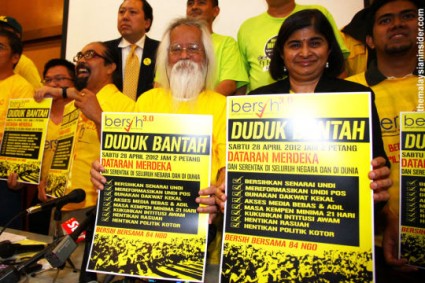Bersih is the Malay word for “clean”. The Bersih movement, also known as the Coalition for Clean and Fair Elections is a group of 84 non-governmental organizations whose aspiration is to push for a thorough reform of the electoral process in Malaysia. In the beginning, Bersih was a political party-driven movement, which later on developed into a non-partisan movement in April 2010.
Bersih started out in July 2005 as a Joint Action Committee for Electoral Reform. A Joint Communiqué on Electoral Reform was a result of an Electoral Reform Workshop held in Kuala Lumpur in September 2006 and this subsequently led to the formal launch of Bersih in the Malaysian Parliament building lobby on 23 November 2006 with members comprised of political leaders from the opposition parties and representatives from the civil society.
In April 2010, the movement was re-named to Bersih 2.0 as a “fully non-partisan” movement and “free” from political influences, which is now solely by the civil society representatives under the co-chairmanship of Datuk Ambiga Sreenevasan and Datuk A. Samad Said. Bersih 2.0 has since expanded the original four demands to eight demands to the government of Malaysia. The demands has since then expanded to eight and they are: clean the electoral roll, reform postal ballot, use indelible ink, free and fair access to media, minimum 21 days campaign period, strengthen public institutions, stop corruption and dirty politics. Apart from the street rallies in 2007, 2011 and 2012, Bersih 2.0 has decided to push forward with its electoral reform campaigns, such as the “Jom 100” campaign in urging the Malaysians to exercise their voting rights and the “Jom Pantau” (let’s observe) campaign in getting citizen observers to watch out deception in yesterday’s polls.
The impact of Bersih on this elections is an important area for further analysis.
Khoo Ying Hooi is a Fellow in the Department of International and Strategic Studies, Faculty of Arts and Social Sciences in University of Malaya. She is also a PhD Candidate at the University Putra Malaysia, in which she examines the impacts of Bersih movement on political change in Malaysia.
 Facebook
Facebook  Twitter
Twitter  Soundcloud
Soundcloud  Youtube
Youtube  Rss
Rss 